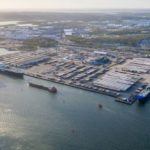Although the road leading to this point has been long and at times rocky, the date of the UK’s withdrawal from the EU is approaching relentlessly.
A ‘soft’ or ‘hard’ Brexit does not matter – the UK will be classed as a ‘third country’ in relation to EU countries such as Sweden, as it will be outside the single market. In its dealings with the UK, the EU will accordingly apply third-country regulations in areas such as tariffs, customs controls, and verification of compliance with EU rules governing the nature and quality of goods.
“The exporter must ensure its goods are ready for clearance through customs before they reach the Port of Gothenburg and our terminals. That is the message we are sending out to the market. If an exporter does not have everything in place, they won’t get in to the port. The same principle applies to imports from the UK – goods that are not ready for clearance before they are shipped to Sweden risk getting stuck at our terminals,” said Elvir Dzanic, Gothenburg Port Authority chief executive.
Challenge for smaller enterprises
The fact that Brexit will eventually materialise will come as no surprise to anyone, least so among those who transport goods to and from the United Kingdom. But Elvir Dzanic appreciates that it could still be difficult for some companies to take the right measures in time.






